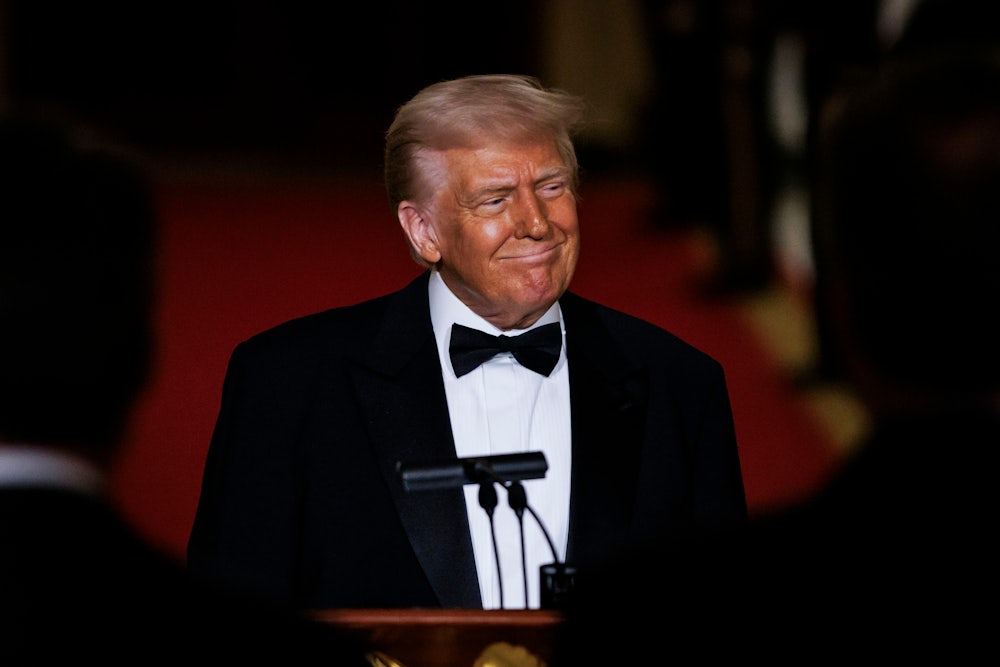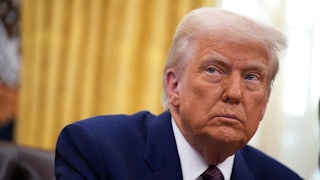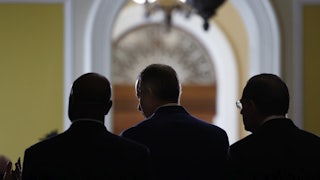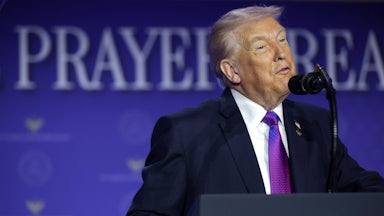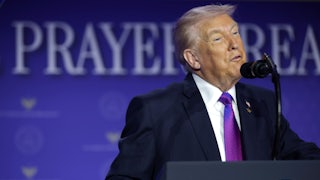Last Thursday, while his henchmen were busy selling out Ukraine and Elon Musk was hoisting that chain saw at CPAC, Donald Trump spoke to the Republican Governors’ Association. He bragged about how much money he’d raised. He talked about helping other candidates. Then he got to the point: “So we’ve got that money, and I got to spend it somewhere, and they tell me I’m not allowed to run,” Trump said. “I’m not sure. Is that true? I’m not sure.”
This was at least the fourth time Trump has “joked” about running again since he returned to the White House—that is, in the last month or so. He did it at the National Prayer Breakfast on February 6. Also at an event in Las Vegas in late January. And during a speech in Mar-a-Lago. On top of these, there was the “joke” the White House posted on social media, apropos of Trump’s attempt to kill congestion pricing in New York, that showed him wearing a crown with the all-caps message “LONG LIVE THE KING!”
When this comes up on cable news, the host typically asks the guests whether Trump is just trolling the libs or should be taken seriously. It’s a silly question, because the answer is obviously both. He’s always trolling. But if you’ve watched these first four weeks and think he’s not capable of finding a way to suspend the Constitution and stay in office, well, you’re not watching the same show I am.
Pay attention, and connect the dots. Trump installed a loyalist at the Justice Department. Pam Bondi is qualified for the job of attorney general on paper, but there is no question as to why she’s really there: To wield the department’s power as Trump wishes. He installed a loyalist—an unqualified one—as the head of the nation’s intelligence services. Tulsi Gabbard will also do whatever Trump wants. And he’s done the same at the FBI. Kash Patel is obviously there to investigate Trump’s political foes and critics. Incidentally, this week, Patel is also apparently going to be sworn in as the head of the Bureau of Alcohol, Tobacco, Firearms, and Explosives. These moves give Trump personal control over the country’s legal and intelligence services.
Then, on Friday night, he took an even more ominous step with a military purge, firing the chairman of the Joint Chiefs of Staff and five other senior officers. His new chairman is another loyalist, John Dan Caine (nickname “Razin”), who does not meet the legal qualifications for the job. Under law, the president can override the language about qualifications if he deems the appointment to be in “the national interest.” I’m not sure about the national interest, but Caine is surely in the Trumpian interest. Trump once claimed that Caine said to him, “I think you’re great, Sir. I’ll kill for you, Sir.”
Those terminated included the judge advocates general of the Army, Navy, and Air Force. Why do they matter? Talking Points Memo’s Josh Marshall put his finger on it last week: “Among many other things it’s the military lawyers who determine what is a legal order and what’s not. If you’re planning to give illegal orders they are an obvious obstacle.”
Personal control over the Justice Department, the FBI, the intelligence services, and the Pentagon, along with a pliable right-wing Supreme Court majority, will enable Trump to do many things. They’re all bad, but it’s having the lackeys in charge of the Defense Department and the Joint Chiefs that are the blaring sirens here. As Heather Cox Richardson wrote on her Substack, Letters From an American, over the weekend, “Observers point out how the purging of an independent, rules-based military in favor of a military loyal to a single leader is a crystal clear step toward authoritarianism.” That can mean a lot of things, but what it most definitely means is that there’s no one around to stop Trump from declaring martial law and suspending the Constitution or even an election.
People tend to dismiss talk of a Trump third term. They say the constitutional hurdles are too great, and indeed they are. Changing the Constitution requires either (1) a two-thirds vote from both houses of Congress along with ratification by three-quarters of the states, or (2) a Constitutional Convention that would again require three-quarters of the states to agree on the change. Neither of those is happening.
But those aren’t the only ways to do it. Presidents can declare martial law. Several have, during wartime or other national emergencies. And a president can do almost anything he wants to under the Insurrection Act. The act, according to expert Joseph Nunn, is “a nuclear bomb hidden in the United States Code.” Nunn also writes that in theory, a president could federalize any armed group and call it a militia, “including members of the Proud Boys, Oath Keepers, and other private militias.” Knowing this, does it make more sense to you now that Trump is putting Patel in charge of the ATF?
If you think I’m being hysterical, I’m sorry, it’s you who are being naïve. Trump has already orchestrated a coup against the United States in which he wanted to see his own vice president hanged. What more proof of his intentions do you need? Yes, he ultimately backed down and left office as scheduled. Privately, he knew he lost. Now, as he’s constantly telling us, he legitimately won—in what he falsely refers to as a “landslide.” He obviously believes he’s been given a mandate to do whatever he wants.
The next presidential election is a long way off. But please—take these “jokes” seriously. And pay attention when he carries out a military purge whose potential consequences include the fact that there will be no one around to disobey an illegal, unconstitutional order that will extend his time in office. He may not be able to do it. He may decide not to, for various reasons—his health has deteriorated, he just wants to golf, whatever. But you’d better believe he’s thinking about it.
